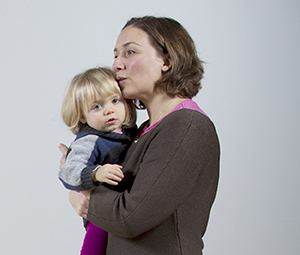A
B
C
D
E
F
G
H
I
J
K
L
M
N
O
P
Q
R
S
T
U
V
W
X
Y
Z
Click a letter to see a list of conditions beginning with that letter.
Click 'Topic Index' to return to the index for the current topic.
Click 'Library Index' to return to the listing of all topics.
Croup
Your toddler has a harsh cough that gets worse in the evening. Now they have woken up gasping for air. Chances are your child has croup. This is an infection of the voice box (larynx) and windpipe (trachea). Croup causes the airways to swell, making it hard to breathe. It also causes a cough that can sound something like a seal barking.

Causes of croup
Croup mainly affects children between ages 6 months and 3 years old. It's most common in children younger than 2 years old. But it can occur up to age 6. Older children have larger airways, so swelling isn’t as likely to affect their breathing. Croup often follows a cold. It is often caused by a virus and is most common between October and March.
Home care for croup
Croup can sound frightening. But in many mild cases, these tips can help ease your child's breathing:
-
Don't let anyone smoke in your home or in your car. Smoke can make your child's cough worse.
-
Keep your child's head raised. Prop an older child up in bed with extra pillows. But never use pillows with an infant younger than 12 months old.
-
Sleep in the same room as your child while they are sick. You will be able to help your child right away if they have trouble breathing.
-
Stay calm. If your child sees that you are frightened, this will make your child more anxious. This may make it harder for them to breathe.
-
Offer words of comfort such as, "It will be OK. I'm right here with you."
-
Sing your child's favorite bedtime song.
-
Offer a back rub or hold your child.
-
Offer a favorite toy.
If the above tips don't help your child's breathing, try having your child breathe in steam from a shower or cool, moist, night air. Here's what to do:
-
Turn on the hot water in your bathroom shower.
-
Keep the door closed, so the room gets steamy.
-
Sit with your child in the bathroom (not in the shower) in the steam for 15 or 20 minutes. Hold your child to reduce the chance that they may get too close to the hot water and get burned. Don't leave your child alone.
-
If your child wakes up at night, take them outside to breathe in the cool night air. Wrap your child in warm clothing or blankets if the weather is chilly.
When to call the healthcare provider
Call your child's healthcare provider right away if any of the following occur:
-
Your child has a fever of 100.4°F (38°C) or higher, or as directed by the healthcare provider
-
Feeling tired or lack of energy (fatigue)
-
Can't handle fluids
-
Cough or other symptoms don't get better, or symptoms get worse
-
Trouble relaxing or sleeping after 20 minutes of steam or cool outdoor air
-
Sluggishness or vomiting
-
Your child doesn't get better within a week
When to call 911
Call 911 right away if your child:
-
Makes a whistling sound (stridor) that becomes louder with each breath.
-
Has stridor when resting
-
Has a hard time swallowing saliva, or drools
-
Has trouble breathing
-
Has a purple, blue, or gray color around the fingernails, mouth, or nose
-
Struggles to catch their breath
-
Can't speak or make sounds
-
Can't wake up or loses consciousness
-
Muscles and skin around ribs pull in with breathing (retractions)
What to expect in the emergency room
A healthcare provider will ask about your child’s health history and listen to their breathing. Your child may be given a medicine that can ease swollen airways and other symptoms. In rare cases, the provider may use a tube to help your child breathe. When your child's breathing gets better, they will be allowed to go home if there are no complications. Sometimes children with croup will stay overnight in the hospital. This allows healthcare providers to observe them for any problems.
Online Medical Reviewer:
Andrew D Schriber MD
Online Medical Reviewer:
Jessica Gotwals BSN MPH
Online Medical Reviewer:
Marianne Fraser MSN RN
Date Last Reviewed:
7/1/2022
© 2000-2025 The StayWell Company, LLC. All rights reserved. This information is not intended as a substitute for professional medical care. Always follow your healthcare professional's instructions.